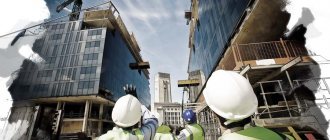Federal Law No. 214-FZ explains in detail how to sell real estate in houses under construction. It protects equity holders—buyers of housing under construction—from fraudsters and guarantees a refund if the developer fails to fulfill its obligations. In the law, the government stipulated what requirements developers must meet, as well as how they must conduct such transactions.
214-FZ is used if during the construction stage the developer plans to sell:
- apartments in an apartment building,
- townhouse, which consists of at least three blocks.
The law does not apply to individual construction, for example, private houses.
How should payment be made under an equity participation agreement?
Purchasing housing under the DDU from a developer at the initial stages of construction is much more financially profitable than purchasing a ready-made apartment. There is an unspoken rule according to which the earlier the equity participation agreement is concluded, the cheaper the apartment costs. At the last stages of construction, square meters in cost are only slightly inferior to the prices existing on the secondary housing market. Therefore, it is most profitable to buy housing and make payments under the DDU during the period when the residential building is still under construction or construction has just begun.
So, you have found a developer, chosen an apartment with a comfortable location, and the managers of the construction company are actively trying to persuade you to sign an agreement. How to pay for DDU? When to pay rent for an apartment with shared participation? The legislation clearly establishes that payment before registration of a child-care facility is unacceptable; it is made only after its registration in Rosreestr. Thus, first the agreement must be signed, then its registration, and only then the funds must be transferred.
Previously, unscrupulous developers, instead of an equity participation agreement, could offer to conclude:
- investment agreement;
- preliminary purchase and sale agreement.
Currently, in accordance with paragraph 2 of Art. 1 of the Federal Law “On participation in shared construction...” No. 214-FZ, the acquisition and payment to the developer for an apartment that has not been put into operation at the time of sale is possible only under a shared participation agreement, and nothing else. The above law regulates all legal relations between the developer and the buyer, including those under the assignment of rights agreement - after its conclusion, the new shareholder receives the same rights as the previous one.
Important!
But even if you and the developer have concluded one of the above-mentioned agreements, there is no need to panic ahead of time. There is a high probability that the court will reclassify such an agreement as a DDU. Of course, this does not always happen; the judge will definitely analyze the content of the agreement and, based on it, make a decision. In any case, you can increase the likelihood of a positive outcome if you seek help from our legal team. Contact information is listed on our website.
You can also calculate the approximate amount of the penalty that you will receive in the event of a delay in the transfer of a shared construction project into your ownership. To do this, just follow the link [anchor href=»h-cons.ru/kalkulyator-neustojki»]“DDU Calculator” and fill out the special fields.
Find out about the mistakes of shareholders that reduce the amount of the penalty here.
Reviews
- Anna, 45 years old: I executed both contracts at different times and I can say that I am satisfied with the result. But I approached the choice of a developer with great caution. My husband and I are pleased with the result.
- Victor, 38 years old: My wife and I thought for a long time about how exactly we would purchase an apartment. We chose a housing cooperative because it implied installment plans. It turned out that shareholders, in fact, have no rights. Deadlines are constantly being postponed, and we have to constantly pay extra, as prices for everything are rising. I don’t know if we will ever be able to own a home.
- Alena, 48 years old: I bought an apartment in a housing cooperative and am very pleased. The deadlines, however, have been delayed, but the prices per square meter are much lower than usual. Probably lucky, because we found an adequate developer.
- Sergey, 39 years old: We participated in preschool education, which is why we found ourselves the happy owners of an apartment just 5 years later. But friends chose a cooperative and flew away, since the developer eventually went bankrupt.
- Gennady, 42 years old: I thought that preschool education was safer, this is how the contract is registered and the terms are short. As a result, the construction was never completed, and I returned the money only after 4 years. I really regret that I chose shared construction.
Payment methods with the developer
Let's consider payment methods for DDU: when and how you can pay for your purchase. Typically, buyers who decide to purchase housing under a shared construction agreement are attracted by the opportunity to pay for the apartment in installments, transferring regular cash contributions to the developer’s account. The amount of such contributions and the payment procedure are provided for in the concluded agreement. However, if the shareholder has such an opportunity, he can pay immediately. In any case, payment under the share participation agreement in construction must be made only after registration of the document with Rosreestr.
Previously, the following methods of calculating the DDU were used:
- opening a letter of credit;
- transfer of funds to the developer’s account;
- payment in cash according to DDU;
- mortgage loan under DDU.
From July 1, 2021, settlements under equity participation agreements are possible only using escrow accounts.
But there are exceptions to this rule. They are provided for by Decree of the Government of the Russian Federation of April 22, 2021 N 480, which sets out the criteria that allow attracting money from shareholders without using an escrow account. This resolution applies to contracts submitted for state registration after July 1, 2021. In particular, the developer may not use escrow accounts if the apartment building is at least 30% complete and the number of equity participation agreements concluded is at least 10% of the total volume of apartments sold.
Requirements for the developer according to 214-FZ
To sell apartments in housing under construction, the developer must obtain a special permit from the Ministry of Construction and Housing and Communal Services. The Ministry of Construction checks:
What is the legal form of the development company?
Permission is issued only to business companies: limited liability companies (LLC) or joint stock companies (JSC). The Ministry will refuse to apply to non-profit organizations or individual entrepreneurs.
Who holds leadership positions in the company
The managers of the developer and the chief accountant cannot be persons who:
- have an outstanding or unexpunged conviction for economic crimes or crimes against government,
- solely owned a company that went bankrupt less than five years ago,
- owned at least 5% of the shares of a company that went bankrupt less than three years ago,
- have been disqualified and have no right to engage in such activities.
Is there a project declaration
To confirm that there are no violations in the project, the developer must attach a special expert opinion to the declaration.
How much money does the developer have?
The company must have its own funds in an amount greater than 10% of the project cost of construction. Such funds include not only money in accounts, but also real estate, land plots or accounts receivable.
Also, before obtaining permission, the developer must open an account with an authorized bank. He must deposit 10% of the project cost of construction into the account. If he doesn't have that kind of money, he can take out a loan. The loan amount must be more than 40% of the project cost.
The Ministry of Construction will not issue a permit if the company:
- has not yet paid for previously taken credits, advances or borrowings,
- issues any securities other than shares,
- pledged her property to secure obligations,
- participates in bankruptcy proceedings,
- suspended activities by court decision,
- did not fulfill the contract or agreement after winning the procurement and ended up in the Register of Unfair Suppliers (RNP),
- failed to pay taxes, fees or other government payments on time.
What experience does the developer have?
The developer must participate in the construction of apartment buildings for at least three years. During this time, he must build at least 5,000 m2 of housing. The Ministry takes into account facilities built by related organizations, as well as projects in which the developer was the technical customer or general contractor.
Who owns the development land?
The developer must own the building site or lease or sublease it.
What is the essence of escrow accounts?
What does this mean in practice? The three parties to the transaction: the seller (developer), the buyer (participant of the DDU) and the bank (guarantor or escrow agent) enter into a tripartite agreement. In accordance with the agreement, the buyer transfers contributions under the equity participation agreement to a special escrow account opened in the bank, and the seller will be able to collect them only after the property is put into operation.
The bank, as a guarantor of the transaction, not only ensures that all conditions are met, but also protects both parties to the contract. On the one hand, the seller will not be able to use the buyer’s money without fulfilling his part of the contract, that is, the buyer’s money is completely protected. On the other hand, the bank guarantees the seller that after the property is put into operation, the developer will receive payment in full.
Thus, if the developer fails to meet the deadline for fulfilling his obligations under the DDU, in addition to the developer’s direct responsibility for violating the deadlines in accordance with the concluded agreement, he will also be punished indirectly: until the construction project is put into operation, the developer will not receive any money.
Features and differences of contracts
Both documents have both their disadvantages and advantages, and there are significant differences between the housing cooperative agreement and the DDU agreement.
The DDU agreement guarantees that the shareholder will receive the property, and in case of unforeseen circumstances, will receive their money back.
But the document always indicates exact terms, and most often they do not exceed 5–7 years. It is during this time that the shareholder must pay the entire amount for the apartment.
When participating in a housing cooperative, a shareholder is not always sure that construction will not drag on for 15–20 years. But he can live in the apartment all this time. True, he cannot sell or bequeath the property.
Problems often arise with the price, since the cost of housing is increasing all the time. And even the advantage of tax credits does not make housing too cheap.
Help: the most important difference between housing cooperative and residential cooperative agreements is state registration. Since the housing cooperative does not register them, there is a possibility that over time the apartment may have several owners. The DDU agreement is undergoing the registration procedure, so it is no longer possible to conclude another agreement with this property.
See the video for the differences between DDU and housing cooperative agreements:
Do you have a minute? #10 Features and differences between housing cooperative and residential cooperative agreements and what is an assignment agreement
Why do buyers pay before registering a DDU?
Despite the clear provisions of Russian legislation regarding the timing and procedure for paying for housing under the DDU, many shareholders still take risks and contribute part of the funds under the DDU before registering the document. Sometimes it is even practiced to pay for the DDU in cash to the cash desk of the development company. The most common reason for such risky actions is the desire to “seize” profitable living space. It is no secret that first, the most liquid options are sorted out in new buildings (sunny side, beautiful view, desired floor, location), and many buyers simply do not want to miss out on an advantageous offer and deposit money before registering the pre-determined property.
Another reason is low cost. When a developer offers a good option for housing at a relatively low price, buyers generally deliberately commit a violation by partially paying for housing before registration. In addition, managers of construction companies competently present all the benefits of such a deal, demanding a “symbolic” advance payment. As a rule, it is 15%. Also, quite often developers attract clients with discounts and bonuses, and when purchasing real estate, even a 1-5% discount is significant in financial terms.
Important!
One way or another, by paying for a share participation agreement before registering with Rosreestr, the shareholder risks his money. A situation may arise that the registration authority refuses to register the developer, and accordingly, the contract will be considered not concluded. If in such a situation, when making payments with the developer, you use escrow accounts, then the problems mentioned above can be avoided. In this case, the participant in shared construction does not transfer anything directly to the developer, thus he is guaranteed to be protected from fraudulent actions of the developer.
If you are unsure of the reputation and integrity of the developer you have chosen, seek help from qualified real estate lawyers. In particular, our specialists are always ready to help with legal support when concluding transactions with construction companies.
Often, developers include a clause in the DDU, which states that the party to the agreement undertakes to reimburse all expenses of the developer for the maintenance of the residential premises from the moment the house was put into operation until the signing of the apartment acceptance certificate. How is payment for maintenance in preschool education carried out? According to the provisions of the Housing Code of the Russian Federation, it must be carried out after the transfer of the residential premises to the participant in shared construction according to the transfer and acceptance certificate.
State registration of documents
The state also deals with the registration of the share participation document, which, most often, is paid and, at the same time, always mandatory. There is no need to register an agreement with a housing cooperative with Rosreestr, but don’t rush to rejoice about it. Firstly, you will most likely have to pay some kind of membership fee. Secondly, this will put you at risk of double sales: when concluding and registering a DDU, this is impossible, since Rosreestr will not register the same document twice. And even if an unscrupulous developer sells your apartment to someone else, bypassing Rosreestr, they won’t even look into it in court and will definitely take your side. Therefore, despite the fact that those who advocate housing cooperatives attract us with their simplicity and speed, we will again give preference to public housing cooperatives. It may take longer and be more expensive, but it is safer.
Taxation under DDU
All financial resources contributed by shareholders are raised as investments in the facility under construction. Further, in the developer’s accounting, they are distributed between funds spent on the construction of the building and funds that are classified as remuneration for the services of the developer under an equity participation agreement. According to the Tax Code, funds from shareholders for the construction of a house cannot be subject to income tax. However, taxes are mandatory on funds intended as remuneration to the developer.
After completion of construction of the facility, an accounting analysis is carried out on costs and funds received. Accordingly, the amount of costs is subtracted from the total amount, resulting in the taxable profit received by the developer.
Management Company
If you have entered into a contractual agreement, be prepared that the developer will assign you a management company, and changing it will not be so easy. If you are a member of a housing cooperative, then you don’t even need to look for a management company, because you (or other members of the housing cooperative you choose) will manage the house yourself.
Summing up the results of this competition, I would like to call DDU the winner. This method of purchasing a home is rightfully popular. But the presence of housing cooperatives on the market (albeit changed, outdated and not very adapted to modern times) is good in itself, as a fact. Because as a result of normal competition, someone will definitely win. This is the client.
What alternative construction financing models exist?
Developers are actively looking for new financial schemes for raising funds that are more profitable compared to project financing.
Alternative financing is permitted by current legislation. For example:
- Construction of an object at the expense of the developer for the purpose of subsequent resale of apartments or own use of the premises for economic purposes. We are talking about the assignment of property rights; developers buy back a certain part of the apartments so as not to use loans and not break the law. Next, the apartments are resold under an assignment agreement, and the proceeds are used to repay the loan.
- Cooperative model (HCM). Housing cooperatives are non-profit organizations (clause 3 of article 50 of the Civil Code of the Russian Federation, clause 4 of article 110 of the Housing Code of the Russian Federation). The cooperative does not have the main goal of making a profit. In essence, it is a mutual aid fund. Members of the housing cooperative - shareholders, with their own funds, participate in the construction of an apartment building. They all have equal opportunities and rights. Remember the restrictions: housing cooperatives cannot build several houses at the same time, and the height of the house being built cannot be higher than three floors (as amended on November 30, 2011, Federal Law No. 349, as amended on July 13, 2015, Federal Law No. 236).
There are other financing models: the creation of a simple partnership (joint activity model), participation in the authorized capital of developers (“corporate” model), construction at the expense of the customer (agency model) and a project financing model.
What to choose?
No type of contract guarantees complete protection from possible troubles . For various reasons, the construction deadline may not be met, and sometimes problems arise with funds.
Only the reputation of the developer can become an additional guarantee for those who choose housing cooperatives or preschool cooperatives . It is best to choose companies that have been operating on the market for more than one year and have large volumes of funds for turnover.
Enterprises value their reputation, because it takes a lot of effort and time to earn it.
The main rule is to carefully study the company’s documents before concluding an agreement . Some people think that housing cooperatives are more dangerous than preschool institutions. The most important risk here is related to the high competition in the market. But even preschool education can miss the deadline.
You need to choose one option or another based only on your personal preferences and capabilities. Each option has risks . For example, if you participate in a housing cooperative, you can start living in an apartment, even if the debt has not yet been paid. Installment plan is available. And obtaining loans here is more profitable. But DDU also has serious advantages in the form of state registration.
DDU or housing cooperative? We determine the risks of each board:
What do banks pay attention to?
It is important for banks to eliminate or minimize the risks of losing collateral and putting the facility into operation.
The financial indicators of the project reflected in the business plan are important. In particular:
- dynamics of apartment sales;
- project sustainability criteria;
- payback.
The most common reasons why developers are denied loans include:
- lack of necessary collateral for the loan;
- insufficient own funds;
- incomplete package of documents;
- claims by shareholders on other developer projects.
Characteristics of housing cooperatives
Housing cooperatives have more affordable prices than DDUs. But there are also more risks when concluding such an agreement . A mutual fund is a pool of funds from everyone who has entered into an agreement for the construction of an object. Funds must be paid every month.
The advantages of purchasing housing under this scheme will be as follows::
- Fast registration. The agreement does not require state registration.
- Open access to construction documents, control of each stage.
- Long installment plan.
- Reduced utility bills due to the fact that shareholders receive a certain profit from the fund.
There are also certain risks:
- If construction deadlines are not met, there are no fines for the housing cooperative itself.
- The price of the property may increase while the contract is in effect.
- Restrictions on resale of shares.
In the next video we will tell you how to buy an apartment in a housing cooperative without risk:
Now, having learned about preschool and housing cooperatives and their differences, let's talk about what is better to choose.
Quality guarantees
The quality of construction is one of the most important parameters by which potential equity holders/shareholders often choose a new building.
Purchasing under the DDU presupposes that the shareholder is a consumer, therefore he is protected by the Consumer Rights Law.
In turn, a member of the cooperative (housing cooperative)
it is not, because a member of a voluntary association, in fact, consumes his own services. Thus, the court will not help protect the rights of the cooperative participant regarding the quality of housing and other construction parameters.
According to the DDU, the developer bears warranty obligations to the shareholder for five years. That is, if, after a certain time after accepting the apartment, the shareholder identifies shortcomings, the presence of which could not be determined at the time of transfer of housing, the developer is obliged to eliminate these shortcomings. Warranty period, which must be specified in the DDU (according to Federal Law-14)
is 5 years. In turn, housing cooperatives cannot be forced to eliminate shortcomings, since Federal Law-215 does not say anything about the warranty period.
Written promises and reaching compromise
It is very important to record all promises and guarantees of the developer’s lawyers or representatives of the sales department immediately in the contract. No verbal assurances! Otherwise, this time can be considered wasted. Know: what is not described in the contract is usually not fulfilled.
After successful (in your opinion) negotiations, you need to carefully read everything again and study the agreement in the new edition. Check:
- whether all the changes you discussed have been made;
- Is the wording accurate (without subtext or additional nuances);
- Are there any other items added to the DDU without your knowledge that will neutralize the changes agreed upon with you?
If you find violations that contradict the law on the protection of consumer rights, you can safely challenge them.
Pitfalls in an agreement with a developer
And now I’ll tell you in more detail what we encountered – what points in the DDU we were confused by, and how the issue was resolved. In general, I was initially prepared for difficulties, therefore, when the lawyer (for convenience, I will call him Yuri) found unfavorable or suspicious clauses in the document and showed them to me, while simultaneously describing the alternative and ways to solve the problem, I immediately called the developer’s office, to make an appointment. We were not satisfied with the points relating mainly to the financial side: the price was tied to the dollar exchange rate and the inflated penalty for the investor was a penalty for termination. That is, if I decide to terminate the contract, I will have to pay 10% of the cost of the apartment.
Rice. 1. Penalty for termination of a pre-employment agreement at the initiative of the shareholder
The third point, the most harmless at first glance, was the connection to a specific management organization, which in the future may lead to an increase in tariffs for home maintenance. A similar point was that from the day the house was put into operation until the apartment was transferred to me, I would be required to pay for the maintenance of the house.
Rice. 2. Payment of utilities
I honestly admit that I myself (without a lawyer) would not have even noticed this point, although I am used to working with documents and carefully read all the papers before signing.








